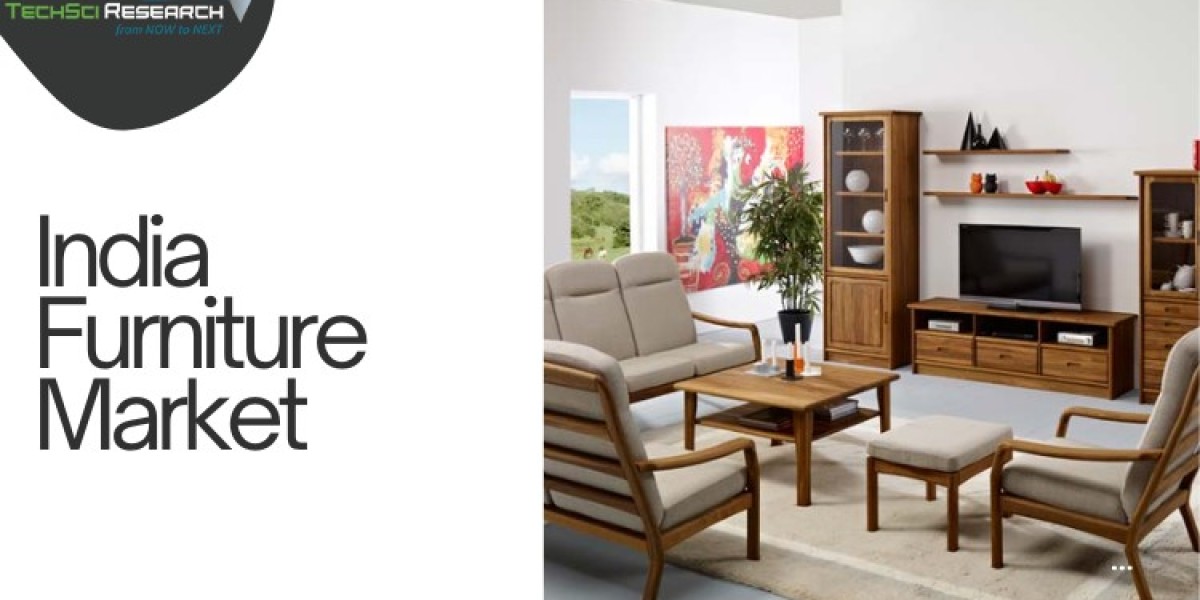Industry Overview
India’s furniture market is undergoing a dramatic transformation. What was once a traditional and fragmented industry characterized by hand-crafted wooden furniture and informal markets has evolved into a modern, tech-enabled sector catering to diverse consumer tastes, lifestyles, and functional needs. According to TechSci Research, the India Furniture Market was valued at USD 27.23 billion in 2024, and is projected to reach USD 39.72 billion by 2030, growing at a CAGR of 6.55% during the forecast period.
This rapid evolution is underpinned by rising urbanization, growing disposable incomes, changing consumer preferences, and an increasingly digital economy. Consumers are no longer just buying furniture—they’re curating their living spaces. From modular storage to ergonomic office setups and aesthetic living room solutions, furniture has become a reflection of personal taste, functional needs, and even sustainability values.
Industry Key Highlights
Market Size (2024): USD 27.23 Billion
Projected Market Size (2030): USD 39.72 Billion
CAGR (2024–2030): 6.55%
Fastest-Growing Segment: Online Point of Sale
Leading Growth Region: Southern India (Bengaluru, Chennai, Hyderabad)
Market Structure: Organized vs. Unorganized; Domestic vs. Imported
Popular Product Types: Beds, Sofas, Wardrobes, Dining Sets
Consumer Trend: Customization, modularity, sustainable materials
Challenges: Raw material cost volatility, intense market competition
Opportunities: Digital expansion, smart furniture, personalization
Download Free Sample Report - https://www.techsciresearch.com/sample-report.aspx?cid=3981
Market Drivers
1. Urbanization & Real Estate Development
Urban India is rapidly expanding. As cities like Delhi, Bengaluru, Mumbai, and Pune continue to witness population influx and residential development, the demand for furniture in new homes and apartments is growing in tandem. Compact city living calls for smart, space-saving, and modular furniture solutions.
2. Rise in Nuclear Families and Solo Living
The increase in nuclear family setups and single-person households has led to a shift in consumer demand. Consumers now seek lightweight, multi-functional, and space-efficient furniture. Modular wardrobes, convertible sofas, and foldable tables are fast becoming household essentials.
3. Growing Disposable Incomes
Higher earning capacity and evolving aspirations are leading to greater investments in home aesthetics and comfort. Today’s consumer is more inclined to upgrade furniture periodically, treating it as a lifestyle product rather than a one-time purchase.
4. Digital Disruption & E-commerce
Online furniture retail has redefined the buying process. With detailed product visualizations, customization options, user reviews, AR-assisted room previews, and doorstep delivery, platforms like Pepperfry, Urban Ladder, Amazon, and Flipkart are reshaping consumer expectations and experiences.
5. Customization & Personalization
The modern Indian consumer doesn’t want generic furniture. There is a growing demand for customized solutions that fit individual lifestyles, space requirements, and aesthetic sensibilities. Personalized coffee tables, bespoke bookshelves, and modular kitchen units are just the beginning.

Emerging Trends in the India Furniture Market
1. Modular & Multi-Functional Furniture
Urban homes are shrinking, but needs are expanding. This has led to the rise of modular furniture—pieces that can be customized, assembled, and reconfigured. Think beds with storage, desks that double as dining tables, and sectional sofas that can be rearranged.
2. Smart & Ergonomic Furniture
The remote work era has made home office furniture a necessity. Ergonomic chairs, adjustable desks, and laptop tables are now in demand. Further, with the integration of technology, smart furniture—like beds with charging ports or voice-controlled lighting—is beginning to gain traction.
3. Sustainable & Eco-Friendly Materials
Eco-conscious consumers are driving the demand for sustainable furniture made from reclaimed wood, bamboo, metal, and recycled plastic. Certifications like FSC and eco-labels are increasingly important, especially among younger buyers.
4. Experiential Retail & Omnichannel Presence
Furniture retailers are offering AR/VR-enabled tools for visualizing furniture in actual spaces, virtual showrooms, and design consultation services. Brands with both physical and digital footprints are gaining customer loyalty by offering immersive and seamless experiences.
5. Regional Aesthetic Revival
Brands are incorporating traditional craftsmanship into modern designs—Mysore rosewood carving, Rajasthani inlay work, Kerala teak wood finishes—all while keeping functionality intact. Consumers want global functionality with a local soul.
Segment-Wise Market Insights
By Supply:
Domestic Supply remains dominant due to cost advantages, customization capabilities, and regional familiarity.
Imported Furniture is preferred in premium urban markets, particularly for contemporary or minimalist designs from Italy, Germany, and China.
By Organized vs. Unorganized:
The organized sector is growing due to brand trust, standardization, online presence, and post-sale services.
The unorganized sector still holds a large market share, especially in rural and semi-urban markets, owing to price competitiveness and local customization.
By Type:
Home Furniture is the largest segment—beds, wardrobes, sofas, and dining sets dominate.
Office Furniture is rising due to co-working trends and remote work demands.
Institutional Furniture (schools, hospitals, hostels) is growing with public infrastructure investments.
By Point of Sale:
Offline Retail (furniture stores, brand outlets) still dominates for high-involvement purchases.
Online Retail is the fastest-growing segment, driven by convenience, reviews, digital visualization, and quick delivery.
By Region:
Southern India is leading the growth curve, driven by IT hubs, real estate growth, and younger demographics.
Western India (especially Maharashtra and Gujarat) remains a significant contributor with strong purchasing power and a mature retail ecosystem.
Tier 2 and Tier 3 cities are witnessing accelerated growth due to rising awareness, disposable income, and e-commerce reach.
Competitive Analysis
Major Players in the Indian Furniture Market
Nilkamal Limited
A pioneer in plastic furniture and institutional solutions; diversified into home and office furniture.IKEA India Pvt. Ltd.
Global retail giant known for DIY furniture and modern Scandinavian design; has introduced affordable solutions tailored to Indian needs.Godrej & Boyce Mfg. Co. Ltd.
Legacy brand with a wide range of office, home, and institutional furniture; strong brand recall.Durian Industries Ltd.
Known for premium wood-based furniture and modern office furniture solutions.Forte Furniture India Pvt. Ltd.
Strong in readymade modular furniture, largely catering to urban demand.Damro Furniture Pvt. Ltd.
Popular in South India, known for quality and competitive pricing.Featherlite Pvt. Ltd.
Specializes in ergonomic office and workspace furniture.Usha Shriram Pvt. Ltd.
Diversified product portfolio including value furniture solutions.Haworth India Pvt. Ltd.
Premium office and commercial furniture player, catering to corporates.Dynasty Modular Furniture Pvt. Ltd.
Growing rapidly in the modular and affordable furniture segment.
Strategic Moves in the Industry
Partnerships with real estate developers to furnish newly constructed homes.
In-house design studios to offer consultation and space planning.
Subscription and rental models gaining popularity among urban millennials and students.
AI-driven product recommendations and 3D room visualizers enhance customer engagement.
10 Benefits of the Research Report
Comprehensive Market Overview – Understand market size, growth potential, and segmentation.
Detailed Consumer Insights – Discover evolving consumer preferences and lifestyle-driven demands.
Region-Specific Analysis – Identify high-growth cities and investment hotspots.
Competitor Benchmarking – Analyze strategies, strengths, and market positions of key players.
Trend Forecasting – Spot and capitalize on emerging furniture design and technology trends.
Strategic Planning Tool – Assist business leaders in making informed, long-term investment decisions.
Online vs. Offline Channel Breakdown – Evaluate the dynamics of e-commerce vs. traditional retail.
Risk Assessment – Understand threats like price fluctuations, imports, and raw material volatility.
Regulatory Landscape Overview – Stay updated on import duties, manufacturing policies, and sustainability mandates.
Customized Insights – Option to tailor the report as per specific business needs or geographical focus.
Future Outlook
The Indian furniture market is poised for a dynamic future, where customization, digital innovation, and sustainable living will define the rules of competition. The evolving urban landscape, hybrid work models, and increased digital engagement are setting the stage for furniture to be more than a utility—it will be an identity statement.
Key Future Trends to Watch:
Smart Homes & IoT-enabled Furniture: Integration of lighting, charging, speakers, and sensors into furniture.
AI-Powered Personalization: Hyper-customization based on user profiles and space data.
Furniture-as-a-Service Models: Subscription-based or rental furniture models for short-term or transitional living.
Circular Economy Models: Recycling and reusing old furniture to promote sustainability.
Expansion into Rural Markets: With rising rural incomes and infrastructure, rural India is a new frontier.
The next chapter of India’s furniture market will be shaped by brands that embrace innovation, respect sustainability, and deliver personalization at scale. From compact city studios to spacious suburban homes and collaborative offices—the demand for thoughtful, stylish, and responsible furniture is only going to rise.
Contact Us-
TechSci Research LLC
420 Lexington Avenue, Suite 300,
New York, United States- 10170
M: +13322586602
Website: www.techsciresearch.com






